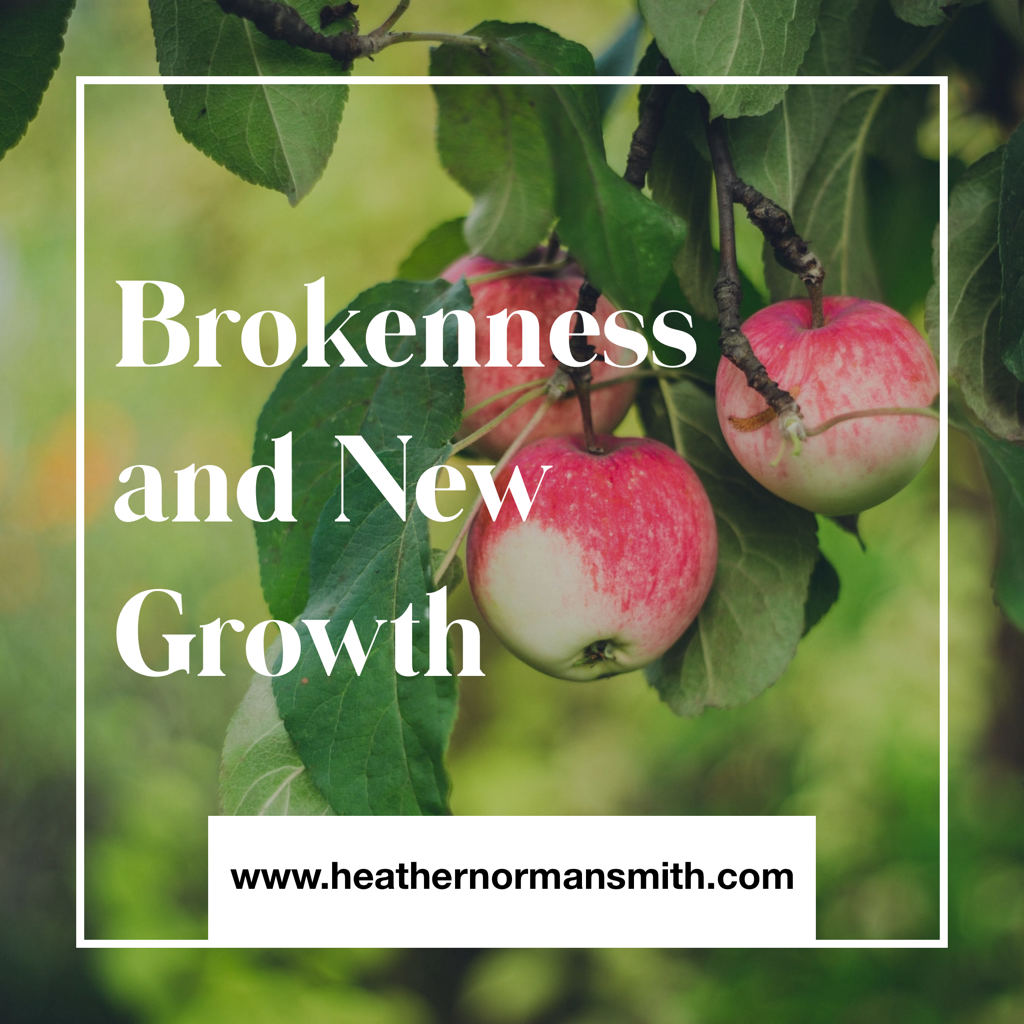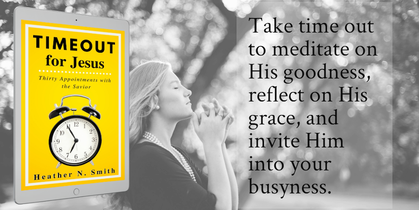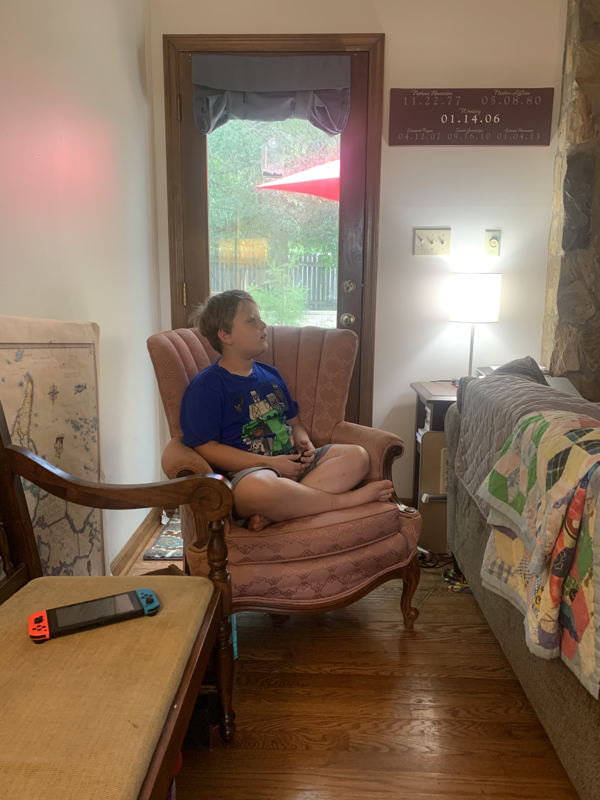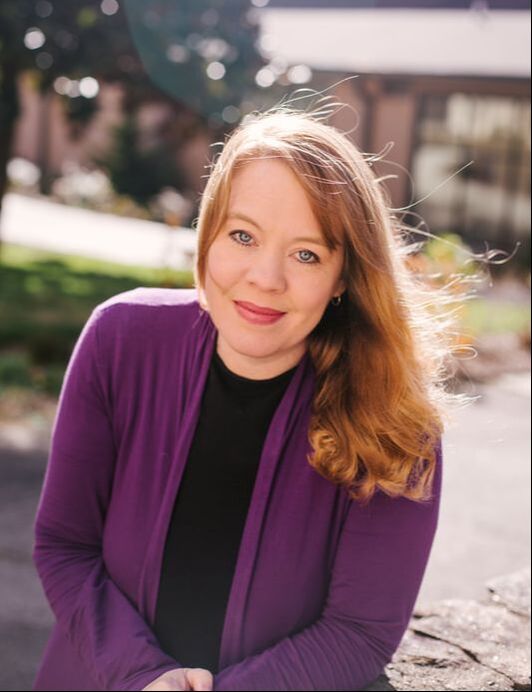|
How do you feel about where you live? Are you anxious to move, or do you plan to stay put for a long time?
I enjoy looking at real estate. We talk about moving "some day." I browse the listings often for houses, or land where we might build a home. Our house is great, but it feels a little crowded for a family of six sometimes, especially as the kids get older and want their own space. I daydream about a house with a covered front porch and a little creek running through a wooded backyard, and with plenty of land to take nature walks and have a garden. The dream house has a big, open kitchen and a basement, suitable for having company over. It would have a screened back porch where I could sit and enjoy writing. But for as much as I think about moving, there’s the idea that I may be too attached to our home of the last twelve years to ever leave it. This is where I’ve raised my children. We’ve made so many precious memories here. We have a nice neighborhood, convenient to schools, shops, and restaurants. It’s familiar. It’s the only home I’ve ever owned. Another thing is that my nine-year-old tells me we can never buy another house, unless we’re able to keep this one, too. She’s adamant that she doesn’t want to move, no matter what kind of place we find. I understand how she feels. I feel a similar pull between my earthly and heavenly homes. The Lord has given me such joy here that I sometimes conflate my earthly blessings with their Source. But the Bible says, “Lay not up for yourselves treasures upon earth, where moth and rust doth corrupt, and where thieves break through and steal: But lay up for yourselves treasures in heaven, where neither moth nor rust doth corrupt, and where thieves do not break through nor steal: For where your treasure is, there will your heart be also.” (Matthew 6:19-21) It’s good to think about the moths and rust. If everything were perfect here, I might never want to leave, but earth is not my permanent home. 1 Corinthians 2:9 says, “But as it is written, Eye hath not seen, nor ear heard, neither have entered into the heart of man, the things which God hath prepared for them that love him.” We can’t fathom it all, but Jesus has prepared a place for us where there are no viruses, politics, or social media squabbles. There is no fear or sorrow. There is no worry about the future. Best of all, it’s where He is. That makes my relocation something I look forward to..."some day."
0 Comments
I walked through the kitchen singing a worship chorus I wrote some time back. The song began sincerely. Sometimes, the Spirit takes over and pours out what I’ve kept bottled up for too long—the praises that are owed to the Lord. But somewhere in the middle of my song, a sneaky spirit of pride crept in, and a fleeting thought hit my mind. I wish more people could hear this song. It’s pretty good.
On one hand, the thought wasn’t terrible. We’re called to use our gifts for Him, and that, in part, means sharing them with others. During the time of coronavirus and stay-at-home orders, I didn’t have the opportunity to sing in church. And my well of words dried up, too. I didn’t write for months. I went through a season of unfruitfulness, creativity-wise, and I felt incomplete not using those particular gifts. The longing for an audience wasn’t necessarily bad. It was normal for someone who feels called to share about God through writing and music. But in another sense, the thought was wrong, strictly prideful, and I was convicted as the Lord spoke to my spirit. “Am I not enough?” I heard Him say. “Do you need a bigger audience than me?” Tears pooled in my eyes. I searched my heart and found an important lesson: When I use my talents, they are not wasted, even if they’re directed to God alone. Every note I sing to Him is of value if it’s done with a sincere heart. If every word I ever wrote served no other purpose but to prove that I would be obedient to Him, they would all be worth writing. Our Audience of One is our most important audience. (There’s a great song called “Audience of One” written by Michael Weaver of the band Big Daddy Weave.) It’s certainly good to have goals, but I don’t have to stress over book sales and social media followers. I don't count compliments about my singing. I have one number to keep up with—one holy God who is my most important audience. The Bible says, “But seek ye first the kingdom of God, and his righteousness; and all these things shall be added unto you.” (Matthew 6:33) The “all these things” in this verse specifically refers to what we eat, drink, and wear, but I think it can be applied to everything He has planned for us, including our audience. The Bible also says, “Delight thyself also in the LORD; and he shall give thee the desires of thine heart.” (Psalm 37:4) That's a conditional statement; we have to focus on Him first. In a class at a writers conference last year, author/instructor Michelle Cox made this powerful statement: “God didn’t call you to be successful. He called you to be faithful.” That has stuck with me all this time. No matter the size of the audience, I'll continue to write and sing for Him for as long as He puts it in my heart to do so. And though I work to hone my creative crafts, and I pray to be used for the Kingdom, I'll leave the results up to Him--my Audience of One. The longer I live, the more awestruck I become at this truth: I have a personal relationship with God. It boggles the mind. The all-powerful Creator of the Universe not only knows my name, He cares specifically for me. Not just mankind. Me. And you, too. The Bible says, “Therefore humble yourselves under the mighty hand of God, that He may exalt you in due time, casting all your care upon Him, for He cares for you.” (1 Peter 5:6-7, NKJV) It’s baffling that human creatures, with all our sin, are able to have anything to do with God, but to think that He cares about us—our hopes, dreams, struggles, fears—is remarkable. Like the psalmist, we have to ask ourselves, “What is man that You are mindful of him?” (Psalm 8:4)
I read an article recently that compared Western and Eastern Christians. The premise of the article was that Christians in the West have a diminished view of God’s holiness because we approach Him casually, as a friend, while Eastern believers express more reverence in worshipping Him as their King. Obviously, God should be revered and respected. He is worthy of our highest praise, and we should honor Him as the King that He is. But I don’t think that precludes Him from being seen as our friend as well. Hebrews 4:16 says, “Let us therefore come boldly unto the throne of grace, that we may obtain mercy, and find grace to help in time of need.” Who can come boldly before the King’s throne except those closest to Him? Jesus told his disciples, ‘No longer do I call you servants, for the servant does not know what his master is doing; but I have called you friends, for all that I have heard from my Father I have made known to you.’ John 15:1 I’m thankful that He’s my King, and my friend. Is He yours? A couple months ago, my son took the seeds from an apple he’d just finished, and, without my knowing, he stuck them in the dirt in a flowerpot in our kitchen. Soon, to my surprise, three little trees sprouted up amongst the flowers, and after a few weeks, I transferred them to a large container outside. The internet tell me that the seedlings have the potential to mature into fruit-bearing trees in about eight years, but interestingly, their product may not be the same variety as the apple from which the seeds were taken, because apple trees do not produce “true-to-seed.” That information led me to research grafting. In order to grow a specific variety of apple, horticulturists graft a branch (called the scion) from a tree of that variety, onto a cut branch of another planted apple tree (called the rootstock.) The previously separate trees merge together, and growth continues. How amazing! And it’s a beautiful picture of how God made us part of His family, allowing us, as Gentiles, to be joined to the rootstock of Abraham. (Read in Romans, chapter 11 about how we have been “grafted.”) But as I studied the grafting process, another spiritual application struck me. You see, before grafting can be accomplished, a tree must be violently injured. The sharp teeth of the saw grind back and forth through the wood until the branch is cut in two and the dismembered portion of the host tree falls to the ground. The woody flesh at the cut point is suddenly exposed. The tree appears irreparably damaged. Then the tree is further damaged as the gardener takes the grafting knife and cuts deep into the broken part. Maybe you feel like that tree. You’ve been hurt, cut off. A painful, dramatic change has occurred in your life, and you are a fraction of your former self. Things seem hopeless. But please remember that, like for the tree, growth is still possible. It’s not the end. Those places that are wounded can be restored with a new calling, a new relationship, a new perspective; and you will be fruitful, maybe even in a way that is superior to what the original “branch” could have produced. Just as many individuals are going through a kind of painful grafting process, I believe the church, and even our nation, are going through it as well. And while we may have to wait to see the results, we can trust God to bring healing to the broken parts. He will create something beautiful in time. “Behold, I will do a new thing; now it shall spring forth; shall ye not know it? I will even make a way in the wilderness, and rivers in the desert.” Isaiah 43:19 I get into my car on a ninety-degree day. The air is stifling. Beads of perspiration form on my forehead in seconds. The steering wheel scorches my hands. As I back down the driveway, it feels as if I’m being roasted alive. There’s no way I can survive those conditions for long. The heat is unbearable. Yet, I don't stop the car and jump out. I don't even roll down the window. Why? Because the first thing I did after I started the car, was turn on the air conditioner. I know it will cool me down soon enough. It only takes a moment to kick in. The discomfort is temporary, fleeting. It can't hurt me. Relief is coming. We’re living in troubled times. Many people are distressed and scared, and my heart breaks for those who are struggling to find peace right now. But if we stop to think about it, there’s nothing truly exceptional about this moment in history. There has always been trouble, since man’s fall. War, plagues, famine—it’s all part of the human experience. Yet God, in his mercy, grants healing and restoration over and over, in a beautiful cycle of compassionate sovereignty. We hurt, then there’s a reprieve. The fighting ends. The plagues leave. The food returns. History proves that our present trials, however big or small, are temporary. And even more so, our faith proves it. Faith tells me that God IS working things out for GOOD, even now. Whether I see the result or not, God’s plans for His children are good, and He has not abandoned us. And faith tells me, too, that we’ll have perfect peace in heaven with Him one day. Pain doesn't last forever. Whether in this life or the next, relief is coming. That’s how we endure trials--with faith that they are temporary. The Bible says, “Weeping may endure for a night, but joy comes in the morning.” (Psalm 30:5b) Hang on. Relief is coming. A woman when she is in travail hath sorrow, because her hour is come: but as soon as she is delivered of the child, she remembereth no more the anguish, for joy that a man is born into the world. John 16:21 For I reckon that the sufferings of this present time are not worthy to be compared with the glory which shall be revealed in us. Romans 8:18 My eyes open at the sound of someone’s feet on the kitchen floor. Mamas awaken at the softest of noises.
I hear the close of the refrigerator then cabinet doors. The coffee maker rumbles to life, and I know my son is up early, working on something special. It’s time for me to get out of bed, but I dare not. It would be unkind to ruin his surprise. Clinking of silverware on glass tells me breakfast will include jelly. Then my son comes in the room to ask a hypothetical question. “If” he wanted to make coffee, which he definitely isn’t doing right now, what button would he push. I provide the instructions, pretending I have no clue what he’s doing. He leaves the room and I wait, and I keep listening, even though I’d rather be out of bed, and even though I don’t actually want breakfast. Choking down toast that I don’t want to eat Is a small price to pay for building his self-esteem. While I wait, I wonder if he washed his hands. Probably not, but I won’t ask him. I’d rather risk E. Coli than damage his desire to serve others. I wonder if he’s making a mess in the kitchen, but I fight the urge to intervene. A mess to clean is a small sacrifice for nourishing his servant’s heart. I wonder if he might burn himself carrying the coffee, but I don’t go help him. The slight risk of a minor burn is preferable to bruising his fragile ego. And when he comes back bringing coffee in one of my favorite mugs and toast with grape jelly (which was actually very good,) I act surprised and praise him for being so kind. I smile as if I’ve won the lottery. And the truth is, I have something even better. I have a child that loves me and wants to show it through acts of service. I have a child that, despite his many behavioral challenges, finds joy in making others happy. So I’ll keep on pretending to be surprised by breakfast in bed, and that jelly toast is better than the best meal ever made, because the fact is, it’s about much more than breakfast. It’s an opportunity for my child to feel good about himself, and for me to tell him that I’m blessed to be his mother. And maybe, as he grows, his sense of self-worth will grow too, and maybe he’ll be able to approach every future task with the same sense of pride as his seven-year-old-self serving his mama breakfast in bed. There are two versions of Christmas; you probably know. There’s the holy celebration of the birth of the Christ child—the One who came to rescue mankind from eternal separation from God and thereby demonstrated God’s deep love for humanity—where we sing His praises and extol His goodness. Then there’s the Christmas where a decorated evergreen tree becomes the centerpiece of our homes, and we sing songs about reindeer, bake cookies shaped like little men, and stress about finding suitable gifts for everyone on our list. It’s the same date on the calendar, the same holiday in name, but two very different celebrations.
Throughout the years, I’ve struggled to reconcile the two Christmases, to keep them balanced. I tend to focus primarily on the birth of Jesus up until the Sunday before December 25th, depending on when Christmas falls. Our church play and the imagery of the nativity are always the spiritual highlight of the season. Then my mind and heart give way to the excitement of family gatherings, classic holiday movies on television, and seeing joy on my childrens’ faces on Christmas morning. But should there be a balance? Should we even entertain the things that would distract us from the manger? As I got ready for church yesterday morning, I contemplated the tug of war between the Christmases and was struck by an unusual comparison: Christmas time is like a wedding and a wedding reception. The vows and exchanging of rings at a wedding is holy, the sacred part which is often followed by a let-loose party. The reception, big or small, is the celebration of what has taken place, though it rarely resembles the ceremony. At a wedding reception, the guests focus on the emotion of the day, if not specifically the reason for the emotion. In that way, Christmas is like a wedding and reception—a blending of the sacred and the secular, where the latter depends on the former. All the warm and fuzzy feelings, the less-than-holy feelings of Christmas, find their roots in a singular emotion, created by and embodied in God Himself: Love. We have love because He came. And the joy of the season, even feelings that don’t directly relate to the Christ child—magic, wonder, coziness, generosity, anticipation—are because of Him. Every good gift comes from God. So maybe there is room for the fun of Frosty and Rudolph after all. Sticking to our analogy, let’s talk about the wedding crashers—unbelievers who celebrate the day set aside to honor Christ’s birth. Our Lord’s name is in the day, yet many who don’t claim Him still celebrate. It’s like not knowing the bride and groom but showing up for the party anyway. They’ll sing carols and bake cookies, string lights and give gifts, yet want nothing to do with the Christ of Christmas. But He came for them, too, whether they believe it or not. And while true joy can’t be found outside of a relationship with Him, a semblance of it exists in their singular version of Christmas, though they haven’t met the Source. Who knows? Maybe they’ll meet Him at the party. When Jingle Bells fades into O Holy Night on the radio, maybe they’ll be drawn to Bethlehem and closer to the truth. As I think on it more, a collision of the sacred and the secular at Christmas seems fitting, really, because that’s what happened when He was born. The Holy One took on human flesh. A perfect God broke the plane between Heaven and Earth. The Most High took up residence in a fallen world. That’s the reality of Christmas. So as you sing Jingle Bells, think of Him. As you think on the manger, thank Him for the presents under the tree. Our celebrations don’t have to be at odds when we are secure in His lordship in our lives The interviewer examines the candidate. Stained shirt and wrinkled pants. His hair is mussed and he hasn’t shaved. “Thank you for coming in today,” the interviewer says, smiling. The interviewee nods. “I’ve reviewed your resume, and I’m impressed with what I see.” The interviewer’s assistant chokes on his sip of coffee. “I think we’ll be able to offer you a very competitive salary,” the hiring manager continues. “The job comes with a corner office and benefits start on day one. Are you interested?” “Sir, what are you doing?” the assistant says. “He has no experience in our field. He has no experience of any kind! I’m not sure why you even brought him in.” “I’ve already said, I like his resume.” “But, sir, his resume is written in crayon. We haven’t done a background check. We know nothing about this person. And you want to give him a corner office?” The hiring manager slides the crumpled resume toward the assistant. “See here? He has an excellent reference. That’s why I’m hiring him. This person’s word is all I need to know that he belongs here.” “But our last candidate went to a top school and has twenty years of experience.” “That’s true," says the manager. "But he doesn’t have the same reference.” As Christians, we became children of God through no merit of our own. We were unworthy of being accepted, not qualified in any way to receive His grace. I’m still not worthy, but my advocate remains. Jesus’ name on my resume of faith makes all the difference. He vouched for me, called me worthy with his very life. It’s not a corner office, but I have something even better. I'm an unlikely candidate, but I have eternal life and fellowship with God, by the righteousness of my Lord. Rom 3:20-25 (ESV): For by works of the law no human being will be justified in his sight, since through the law comes knowledge of sin. But now the righteousness of God has been manifested apart from the law, although the Law and the Prophets bear witness to it--the righteousness of God through faith in Jesus Christ for all who believe. For there is no distinction: for all have sinned and fall short of the glory of God, and are justified by his grace as a gift, through the redemption that is in Christ Jesus, whom God put forward as a propitiation by his blood, to be received by faith. This was to show God’s righteousness, because in his divine forbearance he had passed over former sins. The television had been off for two days. Behavior issues called for drastic measures. But when the two youngest woke me up before daylight on a Saturday, I gave in. I was too tired to engage and keep them quiet enough to not wake the rest of the house. Not without the help of a little electronic intervention. Still, I set a standard. I would choose the program, and it had to at least be educational. The kids, just happy to have television back, didn't complain.
I started the show then shuffled to the kitchen to drop frozen waffles in the toaster. While they cooked, I stumbled around like a zombie, picking up random things that had been strewn about the night before. The boys were happily watching the PBS cartoon. I heard the teacher character tell the students how a microscope works. "Magnify means to makes things bigger," she said. Instantly, God cleared the sleepy fog from my brain and began to grow an idea in my spirit. "Magnify means to make things bigger." Magnify in Scripture means to praise. Psalm 35:3 says, "O magnify the LORD with me, and let us exalt his name together." But how might the common definition also apply? How can we magnify the Lord to make Him bigger? (The Greek word for magnify comes from the root megas, where we get the word mega.) God is already all-powerful, so there is nothing bigger than Him in that sense. But we need to continually make Him bigger in our lives, of greater importance. We need to give him a bigger space to operate through us, by eliminating worldly distractions. We need to use spiritual eyes to see Him as bigger. It doesn't take a microscope. It takes removing the blinders of the flesh to see Him for what He is. Let's look at three uses of the word magnify in Scripture that describe different ways in which God is magnified. Psalm 69:30 says, "I will praise the name of God with a song, and will magnify him with thanksgiving." Being thankful makes God bigger in our lives. When we stop to recognize every good thing as a gift from him, we see him as greater--not some distant force, but an up-close-and-personal sovereign who is worthy of worship. He is literally all-encompassing, acting on our behalf in every facet of our lives. Another well-known usage of the word comes from Mary, the mother of Jesus. Luke 1:46 (KJV) says, "And Mary said, My soul doth magnify the Lord." Mary said this in response to Elisabeth's proclamation in verse 45 (NKJV): "Blessed is she who believed, for there will be fulfillment of those things which were told her from the Lord.” We can magnify God by trusting Him and believing in His promises. Take Him at His word. Even when you can't see the end from the beginning, and even when the road set before you is difficult--as surely it was for Mary--believe He will fulfill His promise to be faithful. In another New Testament reference, when the Holy Spirit was poured out on a group of Gentiles, the Bible says, "For they heard them speak with tongues, and magnify God..." (Acts 10:46 KJV.) Yes, they were praising God, but they made God bigger in their lives by exercising spiritual gifts. They put His greatness on display by operating in the power of the Holy Spirit. It's interesting how all this study started with a line in a children's show, on a Saturday morning when I didn't want to be awake yet. It makes me wonder if the break we had from television for a couple of days helped prepare me to hear God better. Maybe my mind and spirit had a bigger space for Him to work. However it happened, I'm grateful for the message. I need God to be bigger in my life. I want to magnify Him through thankfulness, faith, and spiritual gifts. Maybe a microscope isn't the best metaphor. Sometimes what I need is to view God like a word on a screen, with the web browser zoomed to 1,000%, and everything else pushed out of view except Him. (That's as high as the zoom will go; I tried.) That's what we all need sometimes. May God be made bigger in our lives today. "O magnify the LORD with me, and let us exalt his name together." (Psalm 35:3 KJV) The last couple weeks have been hard. Three months into our first foster care assignment, ugly attitudes have crept into my heart uninvited. I’ve worked to fight it—the “my four and no more” mindset (except in my case it’s five.) But as I struggle to parent this little boy who feels every bit mine one minute and like a stranger the next, negative feelings threaten to win. So, I’m doing some assessment. It’s time for an evaluation of the losses and gains of being a foster parent, and I hope you’ll read to the end for the results. First, let’s look at some of the losses. Patience: I’ve felt like a failure recently, not being able to keep my cool with a toddler who seems to have learned how to push my buttons. Emotionally, I’m not handling the constant meltdowns and tantrums well. It doesn’t matter that I’ve already parented three two-year-olds or that I have trauma-informed parenting skills now. It’s still hard. And the added stress of a fourth child has made me less patient with my other three, and sometimes with my husband. Privacy: One of the most difficult things about foster care, for us, is the never-ending schedule of meetings; having people constantly checking on us and asking questions about every aspect of our lives. The licensing process was the hardest. Our home was inspected multiple times. We laid out every detail of our personal finances and provided complete medical histories for every person in our house. We were required to write about how we got along with members of our family growing up, our parents’ relationship with one another, and how we dealt with the most challenging events in our lives. And we had to share it all with strangers. Now that we have a placement, we have a minimum of two meetings per month, one of which has to be in our home. And though it’s probably not true, I always feel like I’m being judged on the amount of clutter in my house or the dog hair we try so hard to get out of the couch. Peace: We almost had it made. Our kids were old enough that we could turn on a movie for them and take a twenty minute nap on a Sunday afternoon without worrying. Our children no longer cried when they couldn’t have ice cream for dinner or screamed because they wanted to put shoes on by themselves. Before a few months ago, I could sit and listen to an entire church service, undistracted. Now I’m grateful to make it through the singing, forget about the sermon. And sleeping through the night? That’s just a fond memory. Foster parenting has meant loss of the peace we were beginning to enjoy. Now, let’s look at some of the gains of foster parenting. Laughs: The little boy in our care is silly and fun, and he makes us laugh constantly. He loves to get a reaction out of us, and knows how to be a comedian to get it. In the stresses of day-to-day life, his laughter and the laughs he brings are blessings of refreshment. Love: I’ve loved our foster son since very early in the process. Probably by the second day, he had my heart. The way he blows kisses to me and wraps his little arms around my neck just makes my heart swell. He knows how to show love. And we feel it from him every day. The love our three children have for him is phenomenal, and he reciprocates. Love grew in our house when little man entered our lives, and we place great value on that. Life Lessons: I’m glad to be able to teach my children about sacrificing for others. The life lessons they are gaining from this experience will hopefully shape their behavior and attitudes as adults. Foster parenting teaches them that we love all people, including the ones that look different from us; that we should be compelled to care for those who can’t care for themselves; and, that an act of love is worth hardship, every time. And my husband and I are learning, too. We’re learning more how to rely on God when things are difficult and to praise Him more when things are easy. We’re learning to trust Him with unknowns and uncertainty. Foster parenting is teaching us many life lessons. Loss of patience, privacy, and peace. Gains of laughs, love, and life lessons. Now that I’ve laid out a few things to consider, can you tell which way the scale is tipped? Is the bad worse than the good is good? We’re fond of saying that love conquers all, but does that automatically mean the gains are weightier because we love this child? The truth is, the gains don’t outweigh the losses. The losses don’t outweigh the gains. They aren’t balanced and can’t be measured, because there is no scale. Our heavenly calling crushes the scale and renders the entire argument moot. My family has been called to foster care, and by my interpretation, all believers are called in some capacity. Isaiah 1:17 (ESV) says, “Learn to do good; seek justice, correct oppression; bring justice to the fatherless, plead the widow's cause.” Hebrews 13:16 (ESV) says, “Do not neglect to do good and to share what you have, for such sacrifices are pleasing to God.” It doesn’t matter if it’s easy or difficult, or if we feel like we're winning or losing. Our mandate to love others as Jesus loves (John 15:12) overrules any idea of gain or loss. It doesn’t matter if it makes us happy or if it makes us sad. What matters is that it’s right. Taking care of and loving an innocent child that has no one else, is the right thing. No more weighing it out. Update: This post was started a few weeks ago. Since then, we’ve had great improvements in behaviors and how we deal with them. What’s most important is that all along, our little man has been happy and healthy. We thank God for him.
|
About the BlogThank you for visiting my blog. I share devotional articles and musings about life, parenting, and the writing journey, as well as important news about my books. I hope you find something of interest here! Click below to sign up for my email newsletter, which includes links to my latest blog posts. Thank you!
Categories
All
Archives
August 2023
|












 RSS Feed
RSS Feed